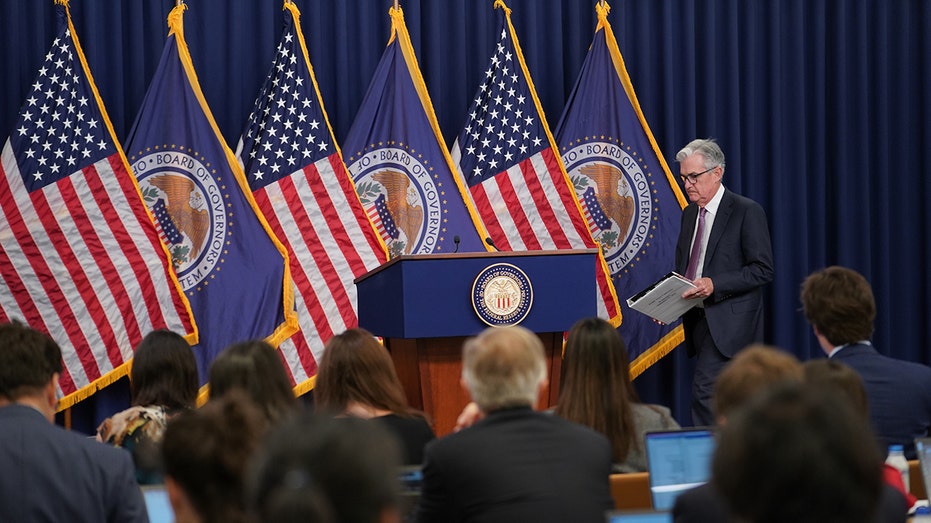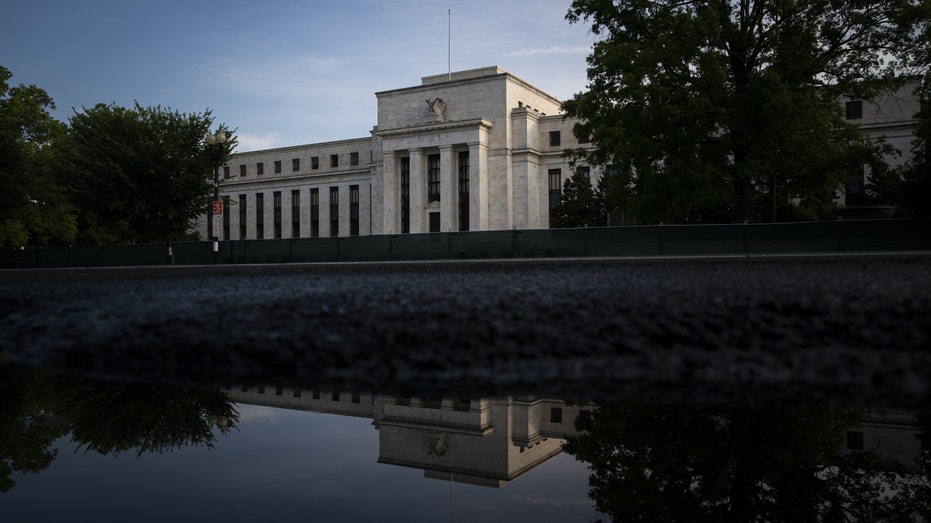Federal Reserve raises interest rates by 75 basis points for third straight month
Central bank continues its inflation-fighting campaign with another big rate hike
Federal Reserve Chairman Jerome Powell holds a press conference following the FOMC decision
Federal Reserve Chairman Jerome Powell holds a press conference following the FOMC decision.
The Federal Reserve on Wednesday raised its benchmark interest rate by 75 basis points for the third straight month as it struggles to bring scorching-hot inflation under control, a move that threatens to slow U.S. economic growth and exacerbate financial pain for millions of households and businesses.
The three-quarter percentage point hikes in June, July and September — the most aggressive series of increases since 1994 — underscore just how serious Fed officials are about tackling the inflation crisis after a string of alarming economic reports. Policymakers voted unanimously to approve the latest super-sized hike.
The move puts the key benchmark federal funds rate at a range of 3% to 3.25%, the highest since before the 2008 financial crisis. It marks the fifth consecutive rate increase this year.
In addition to the large rate hike, Fed officials laid out an aggressive path of rate increases for the remainder of the year. New economic projections released after the two-day meeting show policymakers expect interest rates to hit 4.4% by the end of the year, suggesting that another three-quarter percentage point increase is on the table.
BILLIONAIRE DAVID RUBENSTEIN WARNS INFLATION WILL BE 'DIFFICULT' FOR THE FED TO REDUCE
Officials expect to continue raising rates in 2023, before stopping at a termination rate of 4.6% — well into restrictive territory — and eventually modestly lowering rates beginning in 2024. That is a far more hawkish outlook than officials laid out earlier this year. Policymakers see rates falling to 3.9% in 2024 and 2.9% in 2025.
The rate hike decision and the latest economic projections underscore just how committed the Fed is to wrangling inflation under control, even if that means risking an economic recession.
"We have got to get inflation behind us," Federal Reserve Chairman Jerome Powell said during a post-meeting press conference in Washington. "I wish there were a painless way to do that. There isn’t."
The median projections imply that officials will tighten the benchmark federal funds rate by another 125 basis points this year, suggesting a 75 basis-point increase in November and a 50 basis-point increase in December. But Powell said that no decision has been made yet regarding the size of increases over the next few months and stressed that officials are hinging the decision on forthcoming economic data.
Despite the slew of aggressive rate increases, however, inflation has remained stubbornly high. It ran even hotter than expected last month, with the consumer price index, a broad measure of the price for everyday goods that includes gasoline, groceries and rents, increasing 0.1% in August from the previous month, dashing hopes for a slowdown. On an annual basis, inflation is running at 8.3% — a nearly 40-year high.

Federal Reserve Chairman Jerome Powell arrives to speak during a news conference following a Federal Open Market Committee meeting in Washington, D.C., on Wednesday. (Sarah Silbiger/Bloomberg via Getty Images / Getty Images)
Even more concerning is the surge in core prices, which climbed 0.6% in August from the previous month — a bigger increase than in April, May, June and July, and a troubling sign that underlying inflationary pressures in the economy remain strong.
But the efforts to combat inflation carry a potential risk of recession, with a growing number of economists and Wall Street firms forecasting an economic downturn this year or next. Hiking interest rates tends to create higher rates on consumer and business loans, which slows the economy by forcing employers to cut back on spending. Mortgage rates have nearly doubled from one year ago to 6%, while some credit card issuers have ratcheted up their rates to 20%.
| Ticker | Security | Last | Change | Change % |
|---|---|---|---|---|
| I:DJI | DOW JONES AVERAGES | 49395.16 | -267.50 | -0.54% |
| I:COMP | NASDAQ COMPOSITE INDEX | 22682.729157 | -70.91 | -0.31% |
| SP500 | S&P 500 | 6861.89 | -19.42 | -0.28% |
CLICK HERE TO READ MORE ON FOX BUSINESS
Economists widely agree the risks of a recession climbed considerably this year and that avoiding a downturn in the near future will be increasingly difficult as the Fed tightens monetary policy.
Powell has previously argued that a "soft landing" — the sweet spot between curbing inflation without crushing growth — is possible, but he seemed to abandon that promise on Wednesday. The Fed chief conceded that a recession is possible and that securing a soft landing will be "very challenging."
"The chances of a soft landing are likely to diminish to the extent that policy needs to be more restrictive, or restrictive for longer," he said. "Nonetheless, we’re committed to getting inflation back down to 2%. We think a failure to restore price stability would mean far greater pain."

The rate hike decision and the latest economic projections underscore just how committed the Federal Reserve is to wrangling inflation under control, even if that means risking an economic recession. (Al Drago/Bloomberg via Getty Images / Getty Images)
The updated forecasts showed unemployment climbing to 4.4% by the end of next year, up from the current rate of 3.7%. That's significantly higher than June, when policymakers saw the jobless rate inching up to 3.7%. Estimates for economic growth, meanwhile, were marked down to 1.2% in 2023 and 1.7% in 2024.
"With the new rate projections, the Fed is engineering a hard landing — a soft landing is almost out of the question," said Seema Shah, chief global strategist of Principal Global Investors. "Powell’s admission that there will be below-trend growth for a period should be translated as central bank speak for 'recession.' Times are going to get tougher from here."





















